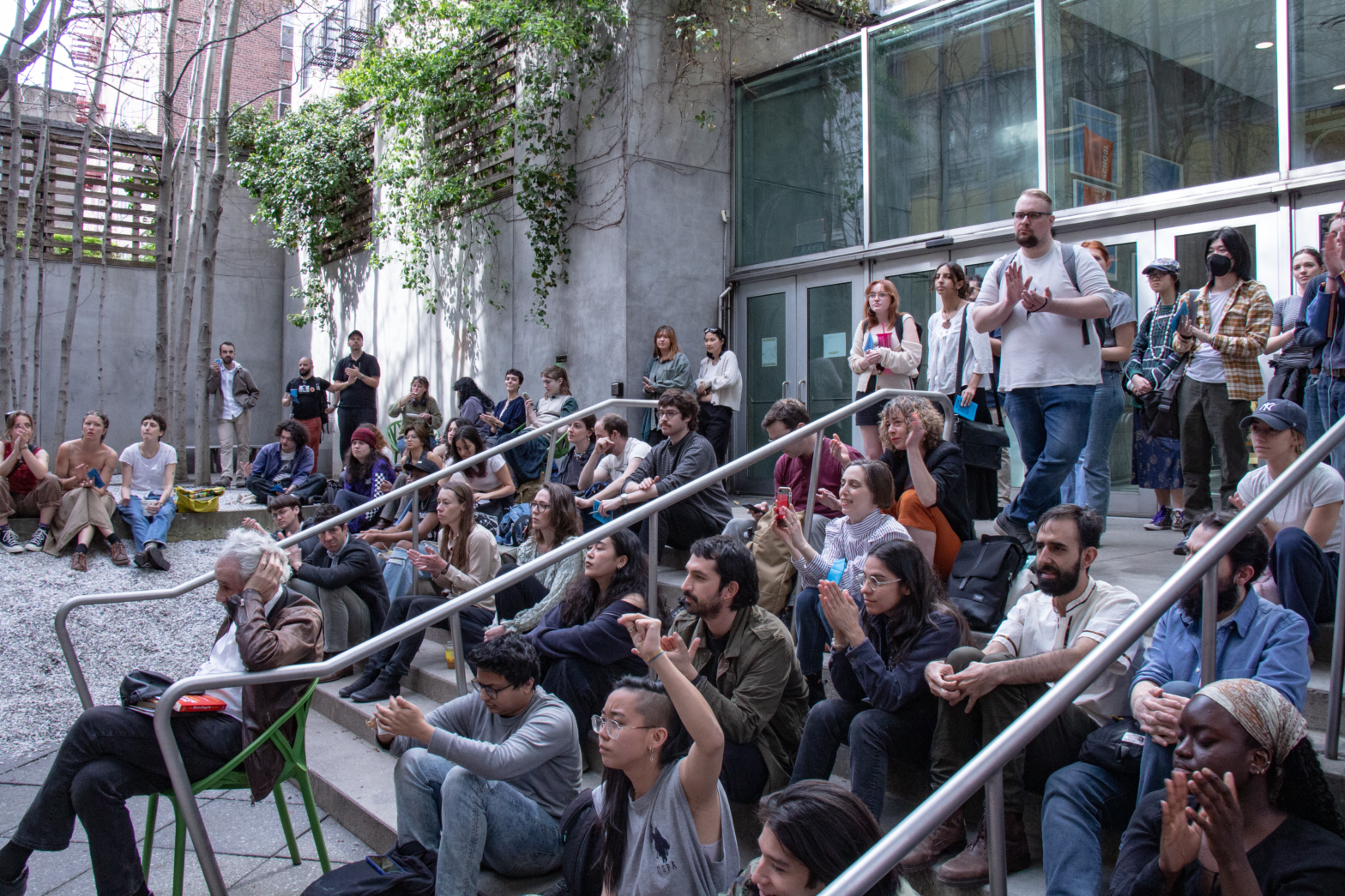This story was updated on April 14th, 2023 at 07:00 p.m.
A group hoping to unionize New School student workers has started organizing potential members by highlighting the university’s union-busting tactics and critiquing the school’s financial practices. In a rally, the undergraduate student leaders of The New Student Workers Union (NewSWU), mobilized workers to sign union authorization cards and learn about their effort.
The group held the event in the Lang courtyard on Tuesday, bringing together students, staff, and faculty members. At the “Rally Against Austerity,” several leaders from unions across the school spoke about the New School’s “austerity,” and encouraged the community to take action to combat it.
Workers in higher education institutions have begun to organize in waves across the country and take action against unfair working conditions. More than 60% of US labor union strikes last year were by academic workers, according to a Bloomberg report.
Currently, The New School’s student workers are separated into two groups, those part of the Union of Student Employees at The New School (SENS), an already formed union for student “academic” workers, and those who are not. As SENS only represents tutors, research and teaching assistants, teaching fellows, research associates, and course assistants, NewSWU hopes to unionize all workers across all departments and create a wall-to-wall union for all student workers to collectively advocate for livable wages, workplace protections, and job security.
“I see [universities] being destroyed by austerity, and I see The New School being destroyed by it too,” said event speaker Julie Napolin, president of TNS’ chapter of the American Association of University Professors.
At the event, economics professor Clara Mattei defined the word austerity as a concrete system of economic policies that trap workers and imposes a rigid economic hierarchy that elevates the owner. According to Mattei, austerity in practice looks like budget cuts, lay-offs, and tuition hikes. These don’t necessarily generate meaningful revenue but rather allow for further accumulation of capital for the wealthiest 1%. “So-called economic pain is inflicted deliberately to make the labor force feel insecure and to stop demanding better conditions,” Mattei elaborates in her book, “The Capital Order: How Economists Invented Austerity and Paved the Way to Fascism,”.
According to Napolin, austerity is often internalized by workers. It creates divides and pins departments against each other, creating a mindset that each worker must isolate and stay silent to unfairness in order to save what little budget is left for themselves. She said, “There isn’t scarcity, there’s enough for all of us…if we’re going to be reimagining the New School, we need to reimagine how to make it affordable for all.”
“It’s never about just cutting the budget. It’s about where the state decides to spend, where the New School decides to spend,” Mattei said. According to her, the way to combat austerity is to open alternatives to the system through collective conversations and action.
Event organizer and student worker Jovanna Liuzzo said it will take the entire New School community to create change, “We are very firm in not wanting to prolong this us-versus-them mentality. We want to be working from the inside and out at the same time because we are students and workers in this administration, so we’re not solely just critiquing it. We’re saying everyone in this system needs to be a part of bettering it.”
Liuzzo and other event coordinators were inspired by the rallies held and organizing work done during the Part-Time Faculty’s contract negotiations last winter. They hoped to create a similar space that fosters community and recreate the collective power exemplified on the picket lines of the adjunct strike.
Fellow event organizer and third-year BAFA student Aarya Kini said the way to begin creating a better future for The New School is simply to come together and talk to one another. “That’s what spaces like this rally are for, is to get everybody in one place in community and solidarity with each other, have them understand the context of what’s happening, and then allow them to respond to that in a place where they’ll be heard and acknowledged,” Kini said.
“Without our work, The New School wouldn’t work,” Emily Li, a member of The New Student Worker Union, said at the event. Li said students, staff, and faculty need to learn to value their labor more and start organizing to end austerity.
Kini said that even those who are not employed by The New School are still affected by austerity. She said the rally gave those in attendance–workers or not–“a moment to all sit down and pause together and really understand what our positioning is within the university. To be cognizant of the fact that we’re not just going to class here, we’re part of a system. A larger system that doesn’t work without the labor of all the people that were present at this rally.”
“You can’t strip every single resource from the workforce and expect the university to still be a place of community and value to students. People will leave,” said Kini. “The reality is that many of us love this place…and we want this to be a space where everyone is treated fairly, where everyone has a say in what happens with our governance.”
Correction: A previous version of this article implied that NewSWU was aiming to unionize the rest of the student workers who aren’t in SENS. NewSWU aims to be a union for all student workers, including those in SENS. The article also previously misspelled a source’s last name. The story has been revised to reflect these changes.








Leave a Reply